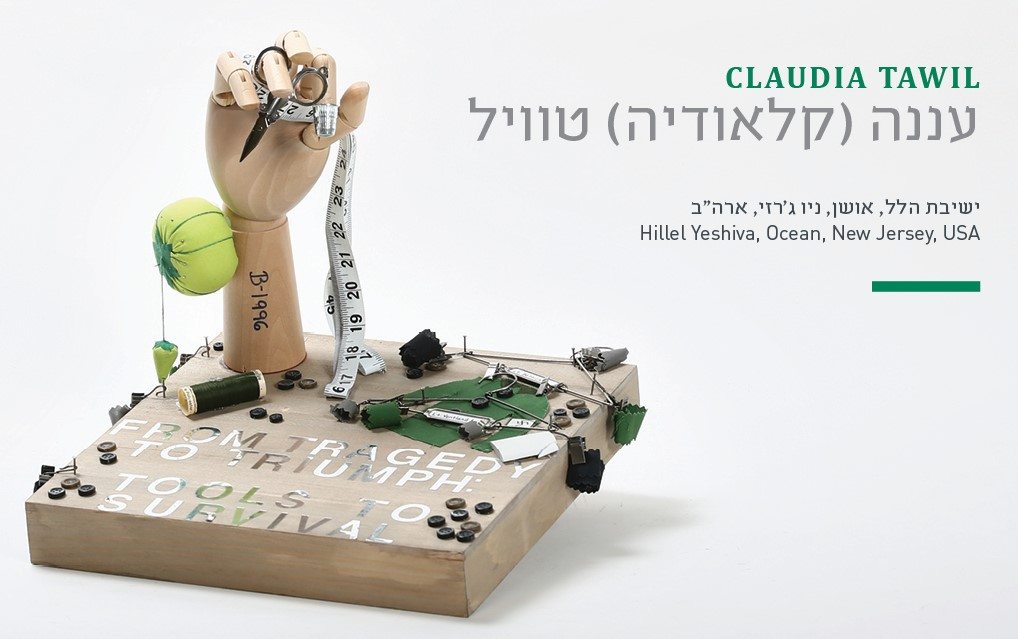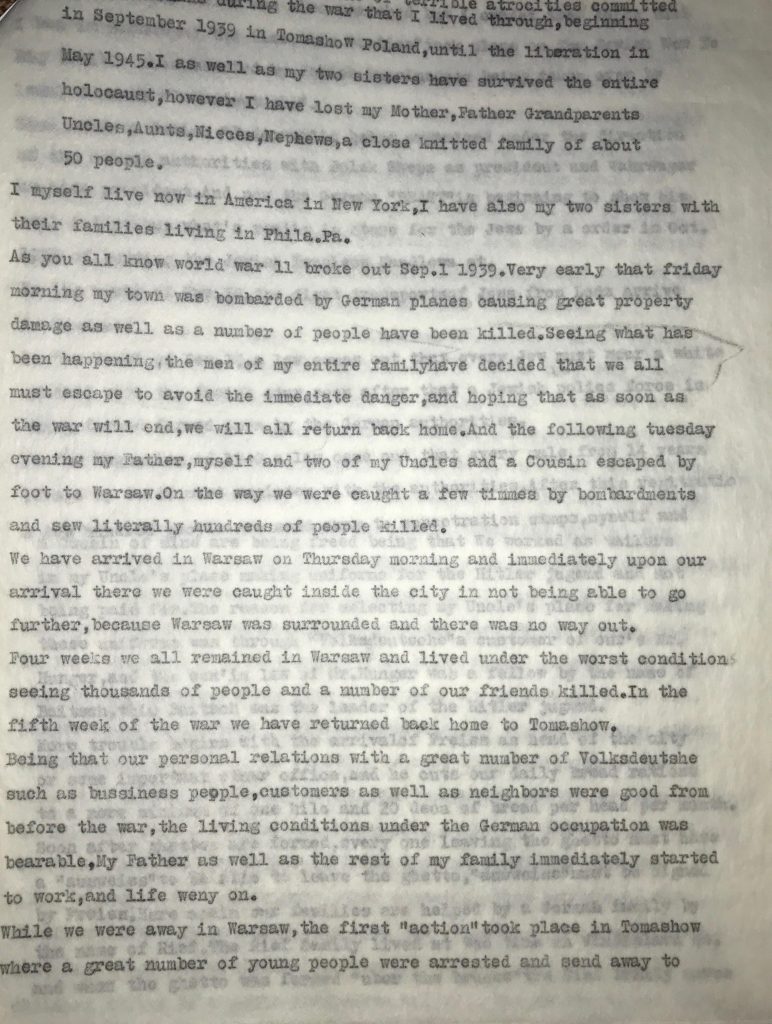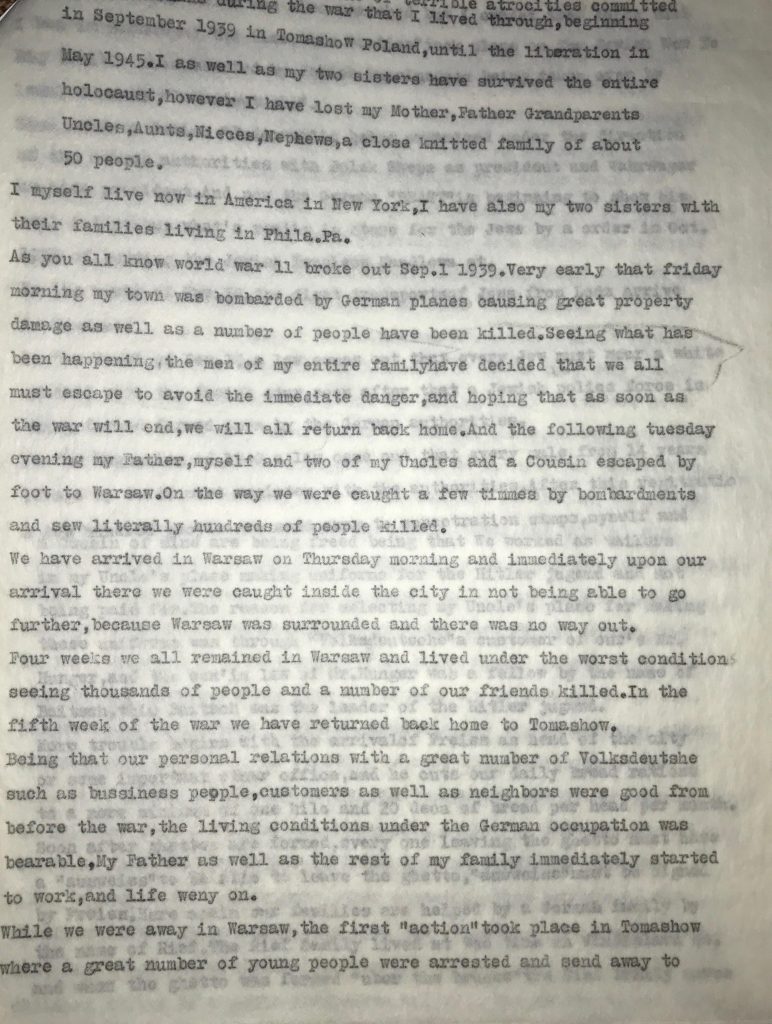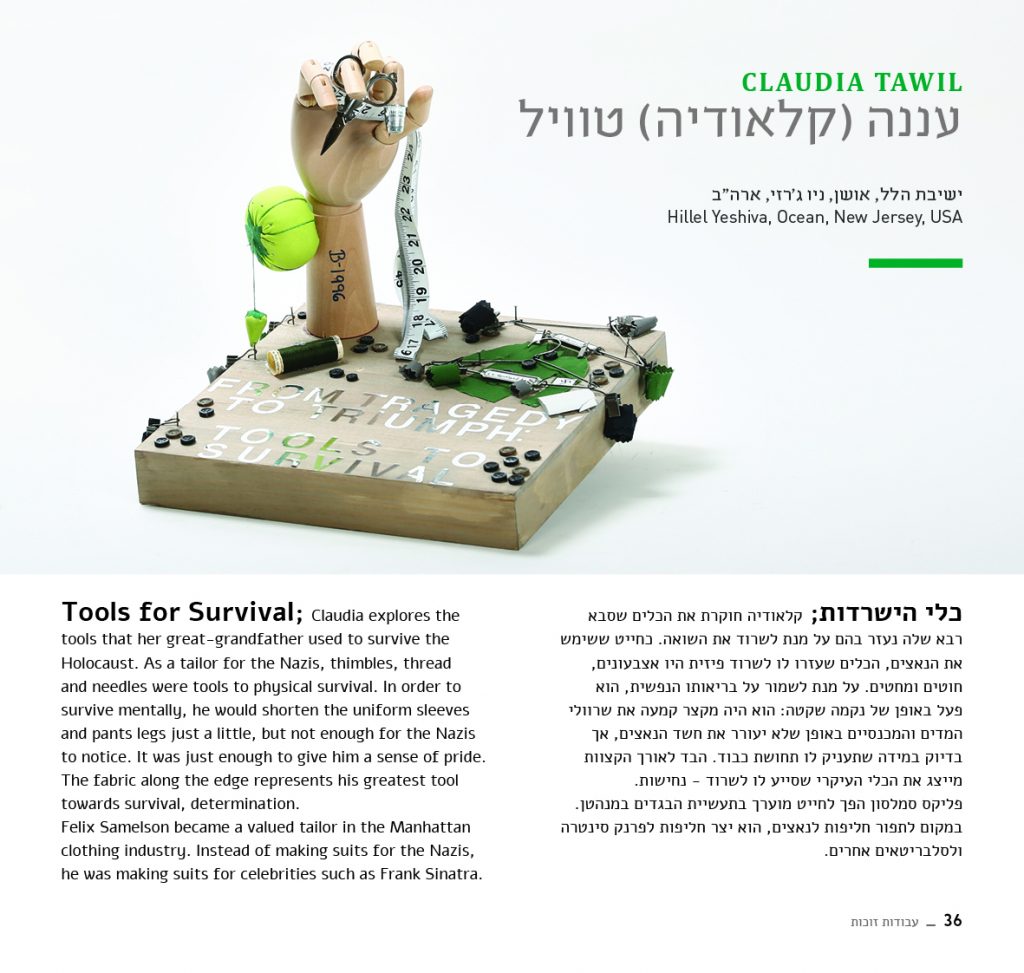Tools of Survival


My name is Claudia Tawil and I interviewed my grandma, Susan Frisch, about my great-grandpa, Felix Samelson.
Susan Frisch: My father, Felix Samelson, was from the city of Thomashow Mozdiez,in Poland. My father was the first immigrant who emigrated to the United States in 1947, from Germany. He entered the USA through Ellis Island in New York.
Before my father was affected by the Holocaust, he lived in a comfortable town. He lived surrounded by his family, cousins, uncles, and aunts. He was very active in many sports clubs and he played with Jews and non-Jews, he also was very musical and played in a band. His family members were trades people, his father was a shoemaker, and very well respected in the town and his mother was a homemaker.
My father only went to school through eighth grade because they didn’t have enough money to go to high school, but he continued his Jewish education in cheder. My grandparents had the same education as he did. His favorite subject was math, history, and music.
My father’s favorite “holiday” was Shabbat because he would go to shul with his grandfather whom he loved more than anything, and he would be the Baal Koreh in shul and sing in the choir and know that his grandfather was beaming with pride. They were religious and modern Orthodox, most of the people in the town were the same. They did attend synagogue every day, including Shabbat and Jewish Holidays. When they came to America, after the war, in order to make it in this country, he gave up a lot of his religious practices because of the war.
In Europe when he was a kid, he played sports, drew, and played music. My father played soccer and it was his favorite, he devoted all of his time to it.
He lived in a small town and his house was an apartment. It was a small house with one common room with a fireplace where they cooked a lot of their food, and two other bedrooms. Downstairs was his father’s shoe shop. They used a common bathroom in the courtyard.
My father’s last name was Samelson, and it wasn't changed. That’s how we tracked down a lot of his relatives after the Holocaust because of the unusual spelling of his last name.
Holocaust Years
When the Holocaust began, what did you father think was going on? In 1939 when they heard this was coming to their town he, his father, his uncle, and his cousin left the women behind and biked to the city of Warsaw to see if the rumors of war were true and that the Germans were sectioning off parts of the city to get rid of Jews. When they saw it was true they biked back home to tell the people in their town that the Nazis were coming.
My father was in a ghetto for four years constantly fearing that he would be selected and taken to a concentration camp where he could be killed, as his mother was. In his ghetto there wasn’t much food, people lived crowded, and in constant fear. After the Holocaust, he met his wife who was liberated from the same train as he was. It was always in his thoughts because it was the most horrific experience, but still he knew he was put on this earth to succeed.
My father survived through tailoring and sewing. Since he was an expert tailor, the Germans used his talent for their own benefit. They used him to make clothes for their wives and girlfriends, and also made German uniforms. But, he always made one shoulder higher and tighter than the other to make sure they weren’t comfortable. He couldn’t shoot them, but he could make their lives uncomfortable.
My father was in Dachau, Aushwitz, Birkenow, Grosshausen, Bergen Belsen. In the camps they made him do tailoring work.
What kept your father going during the war? I’m not sure if he ever gave up but all I know is but the human instinct is to survive and he would always fight back.
After the war, my father decided to write about his experience. He never wanted to forget, and he wanted others to know also.
Testimony After The Holocaust
This is a picture of Felix Samelson's testimony after the Holocaust (8 x 11 inches, Paper and ink, Poland-America, 1945)
Claudia: This artifact is very important to my whole family because it explains what my great grandpa, Felix Samuelson, had gone through during the Holocaust. He wrote this testimony so he could remember everything that occurred. He couldn't write this during the Holocaust because he didn't have anything to write on or with. He wrote this after the war so that in the future no one would think the Holocaust never occurred. This artifact shows all of us the life of a Jew in the horrifying Holocaust where Germans would abuse and kill Jews for no reason.
What is the most amazing thing you think your father did? He built a very successful life for himself, his family, and had his open hand to help every friend he could after the war. He encouraged many others to build their own businesses as well.
My father would always say “Nisht geferlach”-it could always be worse. Which means after all he was through that nothing that ever happened to him would compare.
Claudia's My Family Story display based on her great grandfather's story was displayed in Beit Hatfustot – The Museum of the Jewish People in Tel Aviv, in June 2017.
My Family Story is a meaningful and fun Jewish heritage program that involves Jewish youth from 28 countries around the globe. Students research their roots and use their creative skills to design original, artistic installations that capture the essence of their family history. Top entries are selected for display in an international exhibition in Memory of Manuel Hirsch Grosskopf, displayed at Beit Hatfutsot – The Museum of the Jewish People.
Israel: 20,000 Children explore heritage in art exhibition, on i24NEWS
הזוית האישית
I am so happy I did this interview. I learned so much about that I wanted to know about in the past. I learned that I am so lucky to have everything I have today because when my great-grandfather was in the Holocaust he barely even had food and clothing, and was lucky to survive. I am very surprised how much I didn’t know about my great-grandpa even though my family talks about him all the time. I would love to learn more about my great-grandma’s experience in the Holocaust.
מילון
Nisht GeferlachYiddish: It could always be worse
ציטוטים
”He shortened the Nazi uniforms just a little, to give him a sense of pride“







